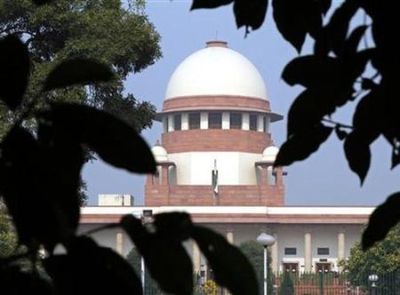 The Supreme Court on Tuesday tersely told the Centre that appointment of judges in higher judiciary is a "serious" business and cannot be left either to the "hit-and-trial" method or to the mercy of God.
The Supreme Court on Tuesday tersely told the Centre that appointment of judges in higher judiciary is a "serious" business and cannot be left either to the "hit-and-trial" method or to the mercy of God.
"This is a serious business. The only problem is that we cannot leave it to God. The appointment of judges is not a hit-and-trial business," a five-judge Constitution bench headed by Justice J S Khehar said during the day-long hearing on the pleas challenging the validity of the National Judicial Appointment Commission.
"Hit-and-trial is part of Constitutional evolution. NJAC should be given a try. It is better then the previous models," Attorney General Mukul Rohatgi told the bench which also comprised justices J Chelameswar, M B Lokur, Kurian Joseph and Adarsh Kumar Goel.
"Then do not say that it is hit-and-trial method. Say that it is fool proof," the bench said.
"It is better than the previous systems," Rohatgi said and later, during the hearing, repeated his earlier statement that the junked Collegium system was akin to "you scratch my back, I will scratch yours".
When Rohatgi was arguing that the right to insist for an appointment or right to be appointed a judge cannot be termed as fundamental right, the bench asked how many such instances are there where the collegium has insisted for appointment of a particular judge.
"Very few," Rohatgi replied and narrated an incident where a person was appointed judge despite serious objections raised by the Government and the President as well.
The bench then referred to an incident where Intelligence Bureau first gave an adverse report on a judge and then changed the findings in the second report.
"It is the question of working of the system," it said, adding, "the system is such that an IB report can be changed. What was the reason for seeking the second report".
The bench also asked the Centre to give a list of all "bad appointments of judges" made under the Collegium system during last two decades.
At the outset, Rohatgi dealt with the doctrine of basic structure and the power of Parliament to amend, delete or substitute constitutional schemes and said that Article 124 (establishment and constitution of Supreme Court) is "amendable" with a strict procedure where half-of-the states need to ratify the Constitutional change.
Referring to a judgment on doctrine of basic structure, Rohatgi said the fundamentals of Constitution like "democracy and secularism" cannot be amended as they will change the face of the Constitution itself.
"Right to oppose or block appointment of a judge is there (in the NJAC). We are debating as to whether the right to insist upon an appointment is part of the basic structure," he said.
Rohatgi said that the power of the executive in the NJAC has been diluted as there is only one representative that is law minister in it in contrast to three Supreme Court judges.
"Under the Constitution, the power was vested with the executive. Then under the collegium system judges started appointing judges in consultation with the executive. Now the third model has to be tested independently. It is a healthy mix," he said.
The attorney general said that the new law, meant to replace the collegium system, cannot be "weighed" on a scale with earlier systems as they are the things of the past.
"You have three top most judges to guide the eminent persons (in the NJAC). You have the law minister to guide them. Please test the new law as it stands today...," he said, adding that the scope of debate is limited as to whether the amendment "falls foul" of the doctrine of basic structure.
Rohatgi said that the opposition to the NJAC could have been "understood and appreciated" if there would have been five outsiders and one judge in the panel.
"Why we are not trusting the biggest block of three judges in the six-member panel?," he said.
"Hence, in judging a constitutional amendment, the question to be addressed is whether the said amendment would lead to a collapse of the edifice of the Constitution.
"Merely affecting or impinging upon an article embodying a feature that is not part of the basic structure is not sufficient to declare an amendment unconstitutional," he said.
He also referred to various articles of the Constitution and said that President, normally, has a ceremonial role and acts on the aid and advice of the council of ministers.
Earlier, the apex court had witnessed sharp exchanges when it took exception to Rohatgi using the phrase "judges appointing judges" to attack the collegium system and observing that B R Ambedkar would have turned in his grave at the way the power was taken away from the executive.
Prior to this, the court had rejected the Centre's plea that the petitions against the NJAC be referred to either nine or 11 judges bench.
The bench, however, had clarified that the issue relating to challenge to the National Judicial Appointment Commission Act, 2014 can be referred to a larger bench at a later stage, if required.
The court is hearing a batch of petitions including the plea filed by the Supreme Court Advocates-on-Record Association against the NJAC.






 © 2025
© 2025